6 Common Harms of Applying Black Henna to Skin and Nails
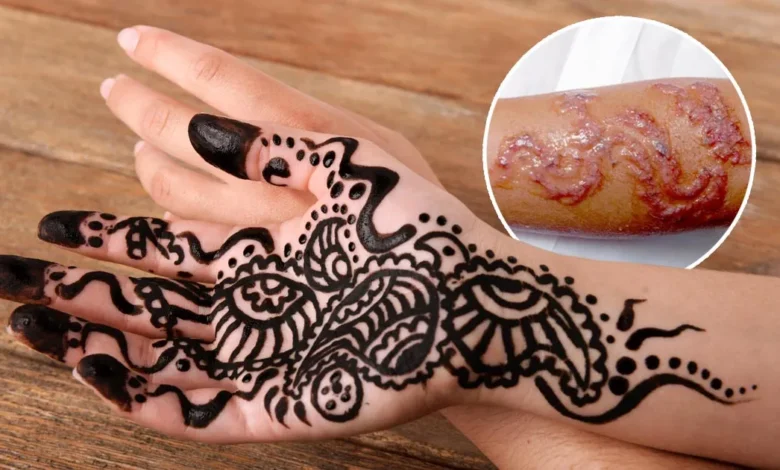
3
Before you try drawing henna, where the wonderful drawings make the hands and nails look good, it is important to respond to the experts’ warnings. Although drawing henna, which is usually no longer associated with weddings only, as the bride draws it on her hands, women who are interested in aesthetic aspects can prefer a specific drawing and ask the specialist. Its application, however, sometimes becomes worrying due to its connection to the possibility of risks or skin problems. We will devote our next article to talking about the expected harms of black henna on the skin, and how their occurrence can be avoided.
6 Common Harms of Applying Black Henna to Skin and Nails
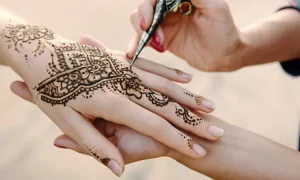

Common side effects of applying black henna to the skin and nails
Henna is obtained from the canna plant or the henna tree, and its dye can be relied upon to color hair. Many people who are interested in relying on natural products resort to it, away from preparations that contain chemical substances, as it is prepared in the form of a paste after the leaves are ground with some other herbs. To give the hair a soft texture in addition to the distinctive bright color. Despite the availability of natural henna powder, you may have heard about nail henna or what is called black henna, which before thinking about using it, you should carefully read the following lines.
How safe is it to apply black henna to the skin?


How safe is it to apply black henna to the skin?
It is a joy to be interested in improving the appearance of your hands and nails, as this is what girls seek and is included in the areas of interest that are added to the skin and hair, but many studies have warned users of black henna of the need to consider conducting a skin allergy test, as some of the ingredients used in the manufacture of this type of henna that has become famous, which may cause poor storage or obtaining it from an unreliable source, may cause allergic reactions to appear on the skin, which may take time until the treatment process is completed, especially in cases where some girls have a tendency to try something different and draw a temporary tattoo with black henna, and from here it was necessary to issue a set of warnings about the topical application of henna, which may leave you with deformities or deep skin scars in some cases
Some manufacturers have developed a safe type of black henna that uses regular orange henna in its manufacture, but a problem has emerged in the slow drying properties of the regular type. To find a solution, it was necessary to add a binding substance, which is paraphenylenediamine (PPD), to the widely available types of henna, which is useful in the process of converting regular henna into black henna. The reliance on this substance is due to the following reasons:
- Increase the darkness of henna pigmentation and make it more stable and lasting.
- An important factor that helps speed up the drying of henna on the skin.
Despite the benefits of this distinctive addition in making henna appear better, it is one of the types of compounds that commonly stimulate allergic reactions on the skin, and it is the same ingredient used in hair dyes. However, the difference here lies in the safety of the proportions that are used. The substance is in hair dyes while the percentages are high in those used for application and drawing on the skin and nails
Common harms of black henna
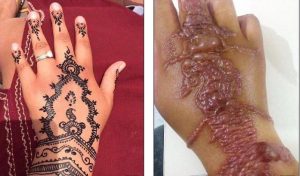

Common harms of black henna
Our article continues to present the most expected harms that may represent common complaints among people due to the use of black henna, including:
1-Allergic reactions


Allergic reactions
A number of allergic reactions can arise from applying black henna to the palm of your hand. Although this may not happen to everyone, it is possible to be exposed to it in the presence of this chemical compound known as paraphenylenediamine (PPD), which people tend to add to enhance the henna color and make it darker. These allergic reactions include the appearance of itchy rash symptoms with redness and irritation of the skin, while in more severe cases you may be surprised by chemical burns on the skin. As for applying it to the nails, if you have a desire to do so, you will notice that the skin around the nails is exposed to inflammation with very unpleasant reactions.
Read also the top 5 reasons why your hair loves henna
2- Nail damage
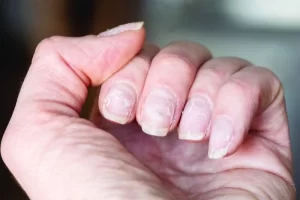

Nail damage
You may prefer the look of your henna-colored nails, but wait a moment to know what excessive use of henna can cause, which exposes the nail to the effect of the chemicals present in black henna, which negatively affects the health of the nails, causing them to be damaged and destroyed, leaving them weak, which increases their fragility and makes them more susceptible to splitting and breaking. With repeated use, the damage increases in the form of dry nails with the appearance of skin flakes, which makes the damage continue in the long term.
3-Permanent pigmentation
You may want to dye your nails with henna for a certain period of time, but one of the undesirable side effects of henna is that it may give unsatisfactory results through the long duration of the pigmentation, which remains on the nails for a very long time without fading, so that the color may fade, leaving a bad appearance for your nails, which causes disfigurement. Its aesthetic appearance, even when thinking about trying methods to remove pigmentation, the methods used are likely to take a long time as a kind of force on the user to try to adapt.
4- Chemical poisoning and burns
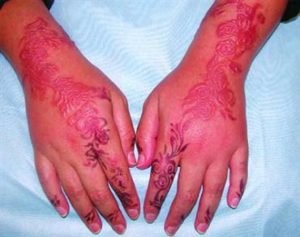

Chemical burns
This is what happens when you focus only on buying a cheap type of black henna without the slightest concern for the safety and security of the product, because it contains chemicals with harmful effects that penetrate the layers of the skin and nails and are absorbed into them. With the intensity of use, frequency of exposure, and long duration, this causes very serious health complications and warns of harm. Risk of chemical poisoning
5- Fungal and bacterial infections
There are some places of unknown origin that offer types of counterfeit products for sale, and they are stored in unhygienic ways. This increases the chances of contracting inflammatory infections caused by bacteria and fungi, which result from the use of contaminated tools that are not sterilized and may constitute sources of transmission of infection to your nails in the form of skin. Spotty around the nails
6-Scar effects
Henna may leave other annoying effects, especially skin scars, which unfortunately may be permanent and are the result of skin burns. The most common type of scars formed are keloid scars.
Tips to avoid black henna damage to nails
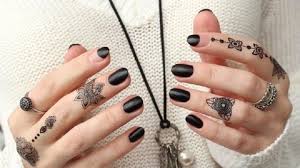

Tips to avoid black henna damage to nails
Important precautions to avoid the harmful effects of black henna on nails
- Your choice should be on safe henna products by selecting places with a good reputation, known for their credibility and reliable products, provided that they do not contain chemicals that cause serious harm.
- Remember to perform a skin allergy test on a small area of skin to minimize allergic reactions.
- Black henna is completely forbidden for certain categories of people, specifically pregnant women and young children.
- Aim to buy natural henna as a safe alternative to black henna. To distinguish it from other henna types, there is a basic measure represented by its reddish-orange color.
- Read the ingredients written on the henna package carefully and stay away from anything that is unsafe
- If you notice any strange symptoms, contact your doctor immediately so that the matter does not get worse.




